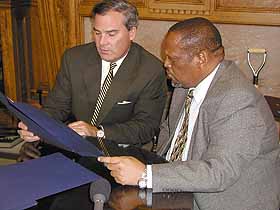|
This is an archived article.
For the latest news, go to the Advance
Homepage
For more archives, go to the Advance Archive/Search Page. |
||
|
Building
on University's Ties, State Joins
Hands with South African Province By Allison Thompson UConn's partnerships with South African institutions have helped pave the way for a developing relationship between the state of Connecticut and South Africa's Eastern Cape Province. During a five-day visit to Connecticut by a delegation of top Eastern Cape officials in late May, the Rev. Makhenkesi A. Stofile, premier of the province, and Connecticut Gov. John G. Rowland signed an agreement to further the friendship and develop economic and trade relations between the two entities.
"We did not choose Connecticut by accident," Stofile said during the meeting with the Governor. He noted that the alliances between UConn and South African institutions benefit all parties, and added: "We also thought the relationship could be broadened beyond the academic phase." Since 1999, UConn has established links with several prominent South African institutions, including the African National Congress. Joint activities under the UConn-ANC Partnership, include archival and oral history projects and scholarly programs on comparative human rights. UConn also has formed a strong relationship, based on the principle of reciprocal learning, with the University of Fort Hare, South Africa's oldest and most illustrious historically black university. Fort Hare is located in the Eastern Cape Province. "The partnerships with South African institutions are important not only to UConn but to the state as a whole," said President Philip E. Austin. "These relationships represent an important means of implementing UConn's commitment to teaching, research and service in the area of human rights, and play a significant role in enhancing the University's and the state's role in the global economy." During the meeting with Eastern Cape officials, the Governor also acknowledged the importance of UConn's relationships with South Africa and expressed interest in increasing ties between the state and the Eastern Cape Province. "We'd like to establish more relationships that are beneficial to everyone," Rowland said. The agreement between Connecticut and the Eastern Cape Province calls for the two parties to share information, create close relationships with particular attention to educational programs and student exchanges, and promote strategic alliances and joint ventures in specific areas that include economic development, education, and tourism. According to Stofile, the province can benefit from Connecticut's expertise in areas such as agriculture, manufacturing, and biotechnolog y. He urged Rowland to visit the Eastern Cape with a delegation of state business leaders. The Eastern Cape delegation to Connecticut also attended a meeting with local business leaders, sponsored by the Connecticut Department of Economic and Community Development. "We may be poor in terms of money but we are rich in resources, historical experience, and human spirit," Stofile told the group. The Eastern Cape is South Africa's second poorest province and, with 6.1 million inhabitants, its second most populated province. It is also of great political and historical significance: leaders such as Nelson Mandela, Oliver Tambo and Steven Biko hail from the region, as well as many top officials in the national government. With the struggle to end apartheid successfully resolved, Stofile said representatives from his province are going around the world to ask others to help address apartheid's legacies and rebuild the province and the country. The premier touted the advantages entrepreneurs would find in South Africa: it is a good market, has low labor costs, and is a gateway to the rest of the continent. The delegation also met with representatives from the pharmaceutical company Boehringer-Ingelheim and Otis Elevator. Boehringer-Ingelheim currently distributes a drug that blocks mother-to-child transmission of HIV free of charge in the developing world, including South Africa, while Otis has been doing business in South Africa for years. The delegation and the corporations discussed ways to expand upon the existing relationships |

